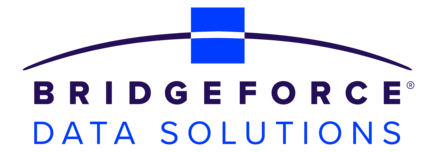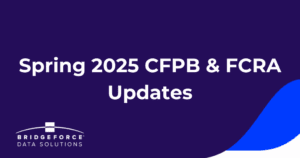Consumer lending and credit reporting comprise a complex ecosystem that requires many stakeholders to ensure the accurate reporting of consumer credit data and compliant handling of disputes. With credit bureaus, regulators, industry trade groups (e.g., CDIA), financial institutions, furnishers, consumers, and more recently credit repair organizations all participating, it’s critical that stakeholders collaborate to ensure accurate credit reporting data is used in consumer lending.
The Consumer Financial Protection Bureau (CFPB) plays a role in providing consumers with a platform to report issues such as incorrect information on credit reports and problems with credit reporting companies. We’ve covered this process in our past blogs.
This is significant because credit reports have a major impact on access to credit and associated costs. While consumers are encouraged to file their own complaints, the involvement of credit repair organizations has raised concerns about legitimacy of those complaints. Last year, the CFPB took a strong stance by imposing a $2.7 billion judgment against credit repair conglomerates for illegal practices, highlighting the importance of addressing these issues effectively.
In this blog, we will dive into the world of credit repair organizations and their effects on the consumer lending and credit reporting ecosystems. We will also discuss how the Data Quality Scanner can help resolve data quality issues and ensure that consumers’ data is being correctly reported.
How Consumers Pursue Changing Credit Data
Consumers can pursue changing their credit data through two main avenues: Do It Yourself (DIY) and credit repair organizations. For DIY credit review, consumers can obtain a free copy of their credit report from each of the three major credit bureaus—Equifax, Experian, and TransUnion—through sites like AnnualCreditReport.com. Once they have their credit reports, consumers can review them for errors and submit disputes online directly to the credit bureaus and/or to the furnishers who reported the trade lines.
Alternatively, consumers may opt to hire credit repair organizations. These companies offer services such as reviewing credit reports, disputing inaccuracies on behalf of the consumer, and providing advice on improving credit scores. While these services can save time and effort, they often come with fees and may not consistently deliver the promised results. To avoid scams and fraudulent practices, consumers must research and choose reputable companies for support. Nonprofit credit counseling firms are often the best choice for consumers.
Common Reasons for Wanting to Change Credit Data
There are many reasons why consumers might seek credit repair services. One reason could be that there are legitimate errors on their credit report. Mistakes such as incorrect personal information, accounts that don’t belong to the consumer, or inaccurate payment histories can significantly impact creditworthiness. Another reason is that the person has suffered from identity theft. Victims of identity theft often find unauthorized accounts and fraudulent charges on their credit reports. Additionally, consumers may seek credit repair due to a desire to remove negative information (such as late payments), even if the information was accurate.
Understanding the reasons behind credit repair, how it is accessed, and its impact in the industry can help consumers better manage their credit and improve their financial health.
What are Credit Repair Organizations (CRO)
Credit Repair Organizations are businesses that offer to improve a consumer’s credit score by disputing inaccuracies on their credit reports and negotiating with creditors.
The CFPB states that you should only dispute information when it’s inaccurate, but credit repair organizations typically dispute accurate items on reports as well. This could lead to accurate items disappearing temporarily while the information is verified, then reappearing on your credit report, causing a credit score to change and then revert to what it was.
CROs’ services come at a cost. Consumers usually pay initial fees or monthly service charges ($400 one-time fee or $60-150 a month), which can add up over time. These fees are often called ‘subscription fees’ to bypass the illegal practice of charging upfront fees.
Moreover, the effectiveness of these agencies can vary significantly. Some agencies may only achieve minor improvements in a consumer’s credit score, while others might deliver more meaningful results.
What CRO’s should not be confused with
As mentioned earlier, the CFPB has provided resources on what CRO’s should not be mistaken for. This includes services such as nonprofit credit counseling, debt settlement, debt consolidation, and general do-it-yourself credit fixing.
Credit Counseling
The National Foundation for Credit Counseling provides consumers with certified credit counselors who offer personalized action plans and resources for those struggling with debt and poor credit. These groups provide free resources and education but can also offer paid services, such as debt management plans. In a debt management plan, the consumer makes one payment to the organization, which then makes monthly payments to the creditors.
Debt Settlement Companies
Debt settlement companies negotiate with lenders to reduce debts for a fee, typically using lump sum payments saved in advance. However, many lenders do not negotiate with these companies, and debt settlement often cannot secure better terms than direct negotiation. Funds saved remain the consumer’s property, but companies may collect them as fees instead of using them to settle debts. Guarantees on debt savings, timelines, or the erasure of all debts cannot be provided, and advising clients to stop payments can further damage credit and increase debt collection efforts. Additionally, companies charging upfront fees may be acting illegally.
Debt Consolidation
Banks, credit unions, and other lenders offer debt consolidation loans. These loans allow borrowers to repay multiple debts with a single loan, simplifying payments. The debt consolidation loan is repaid over time and may have a lower interest rate than existing debts. However, low interest rates may be “teaser rates” that apply only for a limited time, after which payments could increase. While monthly payments might be lower, this could be due to a longer repayment period. Considering the loan’s duration, fees, and costs, overall payments might be higher than the original debts.
Challenges with Credit Repair Organizations
Despite the opportunities for improvement in credit data, CROs have challenges due to several prevalent issues within the industry. First and foremost, some CROs engage in fraudulent practices. These companies may charge high fees for services that produce little to no improvement in a consumer’s credit score. They might also make false promises, such as guaranteeing specific results, which is impossible given the complexities and uncertainties of credit repair.
Another commonly reported challenge is the use of illegal or unethical tactics. For example, some CROs may advise clients to dispute accurate information on their credit reports, a tactic known as ‘credit washing,’ which is both dishonest and ineffective in the long run. Such practices may lead to temporary boosts in credit scores, but these improvements are often short-lived and can result in further complications once the disputes are resolved in favor of the creditors.
Additionally, some credit repair organizations may collect illegal advance fees. As the CFPB notes, under the Credit Repair Organizations Act, it is illegal for credit repair companies to request or receive payment before they have successfully delivered on their promises. Unfortunately, many consumers are unaware of this regulation and fall victim to scams. As mentioned, the CFPB imposed a $2.7 billion judgment against a major credit repair conglomerate for collecting illegal advance fees through telemarketing.
Lastly, reliance on credit repair organizations can sometimes prevent consumers from addressing the root causes of their credit issues. Actual credit improvement requires not just the removal of inaccuracies but also the development of sound financial and payment habits. Consumers who rely solely on credit repair organizations may miss out on valuable financial education and continue to struggle with credit problems in the future.
Given these risks, exploring DIY options to fix legitimate errors and seeking advice from nonprofit credit counseling organizations can provide more reliable and cost-effective solutions for managing personal credit issues.
The Impact of Credit Repair Organizations on Consumer Lending
Credit repair organizations significantly impact the consumer lending ecosystem, influencing consumers and lenders in various ways. While there may be some positive aspects when consumers work with a reputable organization, such as helping them rectify valid credit report errors and potentially improve their credit scores, the negative consequences often overshadow these benefits.
Positive Aspects
When done right, credit repair organizations can assist consumers in identifying and disputing valid errors on their credit reports, leading to improved credit scores. This might help consumers qualify for loans with better terms and lower interest rates. For diligent consumers who use DIY resources or choose reputable credit repair organizations, these services can provide valuable support in navigating the complexities of credit reporting and improving their financial standing.
Negative Aspects
Despite these benefits, the presence of credit repair organizations often creates significant challenges for lenders and credit bureaus. One of the primary negative impacts is the increased volume of credit bureau disputes that furnishers must handle. When consumers or credit repair organizations dispute items on a credit report, lenders and credit bureaus must investigate and respond within a specific timeframe. This process can be resource-intensive, requiring substantial time and effort from the staff. Frequent disputes can strain their operations, diverting attention from other critical tasks and potentially slowing the lending process.
Another issue is the possibility of fraudulent and baseless disputes. Some credit repair organizations might encourage consumers to dispute accurate information on their credit reports to temporarily improve their credit scores. As mentioned previously, this “credit washing” tactic can result in a flood of false disputes, adding to the workload of lenders and complicating their ability to accurately assess a borrower’s creditworthiness. Fraudulent disputes not only consume resources but can also undermine the integrity of the credit reporting and lending system.
The rise in disputes has also led to increased regulatory scrutiny for lenders, who must comply with all relevant laws and regulations when handling disputes. The increased volumes of consumer complaints and disputes for lenders and credit bureaus can result in heightened focus from regulators such as the CFPB and additional administrative resources and costs. Lenders and credit bureaus who fail to manage disputes compliantly risk facing fines, lawsuits, and reputational damage.
Moreover, reliance on credit repair organizations can mask consumers’ actual financial behavior. If valid negative information is deleted from a credit report because of a dispute, lenders might not have a comprehensive and accurate understanding of a borrower’s credit risk. As a result, this can lead to increased rates of defaults and financial losses, as lenders grant credit to individuals who may not be capable of managing their debt effectively.
In conclusion, while credit repair organizations can provide some benefits to consumers, they often create significant challenges that impact consumers and the consumer lending ecosystem. The increased volume of disputes, potential for fraud, regulatory scrutiny, and erosion of trust all contribute to a more complex and burdensome consumer lending environment. For the consumer lending ecosystem to function effectively, addressing these negative impacts and promoting transparency and accuracy in credit reporting and disputes handling is crucial.
Preparing Businesses to Combat Credit Repair Organizations Through Better Data Quality
With the vast number of Credit Repair organizations out there today, as well as the growing number of consumers voicing their concerns over credit reporting, it is more crucial than ever for businesses to get ahead through accurate Metro 2® credit data reporting and disputes resolution.
Using tools like the Data Quality Scanner, furnishers can ensure that they accurately report their Metro 2® credit data and resolve any identified data quality issues. Taking this proactive approach has been shown to reduce credit reporting errors by 90%+ and decrease credit reporting dispute rates by over 30%.
With this automated data-first approach, lenders of all sizes can ensure that consumers’ data is reported accurately. When errors appear, they can be fixed quickly before any sustained impacts on a consumer’s credit score.
The Data Quality Scanner is a low-cost, low-IT solution that looks at every account being reported or disputed. Utilizing a ruleset of over 380+ risk-ranked rules, the Data Quality Scanner has processed 100’s of millions of accounts and is a game-changer.
Also, with the new Credit Bureau Disputes Module, Disputes Analysts can quickly complete expanded reasonable investigations that can uncover data quality issues in the disputed data and sources of those issues, and management can determine how well their Disputes team is addressing these issues.
This holistic view of the credit reporting process allows lenders and credit bureaus to identify problems before any credit repair organization can find them and effectively refute any frivolous or dishonest disputes. This automated data-first approach helps consumers and can significantly reduce the operating expenses and regulatory risks that arise from inaccurate credit reporting and disputes data.
To learn more about the Data Quality Scanner, visit our website – https://bridgeforcedatasolutions.com/
More About Bridgeforce Data Solutions
Bridgeforce Data Solutions is a unique financial technology firm with over a decade of experience serving financial institutions of all sizes, that offers the only comprehensive accuracy solution for credit reporting and disputes. Unlike any other in the market, these automated solutions help lenders of all sizes inspect, benchmark, and optimize their credit bureau data quality.
The Data Quality Scanner has two primary modules: Furnishing and Disputes. These modules are designed to provide lenders with a comprehensive solution for managing their credit bureau data quality, offering a range of features such as data inspection, benchmarking, and storage, all in a user-friendly and efficient interface.



